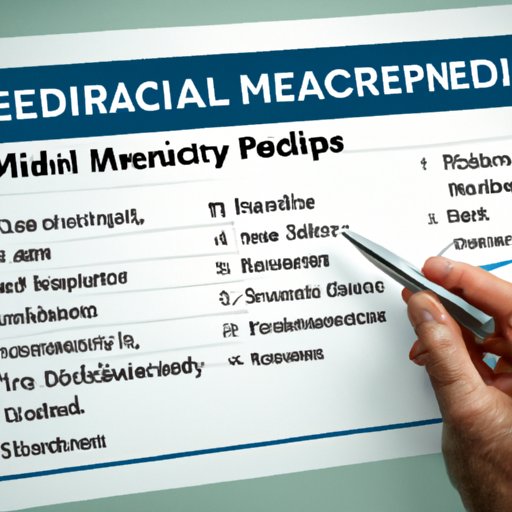Introduction
Medicare is a national health insurance program that provides coverage for people 65 and older, as well as some younger individuals with disabilities or end-stage renal disease. The program is administered by the Centers for Medicare & Medicaid Services (CMS) and is designed to help eligible individuals cover medical expenses. Understanding what makes you eligible for Medicare can help you make informed decisions about your healthcare coverage.

Explaining Eligibility Criteria for Medicare
In general, there are three main criteria that determine whether you’re eligible for Medicare: age, employment history and spousal eligibility. Let’s take a closer look at each one.
Age Requirements
If you’re 65 or older, you’re typically eligible for Medicare. If you’re under 65, you may be eligible if you’ve been receiving Social Security Disability Insurance (SSDI) payments for two years or more. You may also be eligible if you have end-stage renal disease or amyotrophic lateral sclerosis (ALS).
Prior Employment History
To qualify for Medicare Part A, which covers hospital stays, skilled nursing care and other inpatient services, you must have worked and paid Medicare taxes for at least 10 years. This requirement doesn’t apply to Part B, which covers doctor visits, outpatient services and some preventive care.
Spousal Eligibility
If you’re married, you may be eligible for Medicare based on your spouse’s work record. Your spouse must have worked and paid Medicare taxes for at least 10 years, and you must be at least 65 years old. If you’re widowed, your late spouse’s work record may still make you eligible for Medicare.

Understanding When to Enroll in Medicare
Once you’re eligible for Medicare, you must enroll during a specific period of time in order to avoid penalties. During your initial enrollment period, you can sign up for Parts A and B. This period begins three months before you turn 65 and ends three months after. If you don’t sign up during this period, you’ll have to wait until the general enrollment period, which runs from January 1 to March 31 each year.
You may also be able to enroll outside of these periods if you meet certain criteria. For example, you may qualify for a special enrollment period if you lose your employer-sponsored health coverage or move to a new state.

Exploring Key Factors That Determine Medicare Eligibility
Your eligibility for Medicare depends on several key factors. For instance, your disability status may affect your eligibility. If you’re disabled and receiving Social Security benefits, you may be eligible for Medicare before age 65. Additionally, if you have end-stage renal disease, you may be eligible for Medicare regardless of your age.
Breaking Down the Costs of Medicare
It’s important to understand the costs associated with Medicare before you enroll. Most people don’t have to pay a premium for Part A, but if you do, it’s typically around $437 per month. For Part B, the premium is usually $134 per month, although this amount may change depending on your income level. Other out-of-pocket costs include copayments, coinsurance and deductibles.
Identifying Resources to Help You Understand Medicare Eligibility Requirements
If you need more information about Medicare eligibility requirements, there are several resources available. The official Medicare website, Medicare.gov, is a great place to start. You can also contact the Social Security Administration or the State Health Insurance Assistance Program for assistance.
Conclusion
Eligibility for Medicare depends on factors like age, prior employment history and disability status. It’s important to understand the eligibility criteria and when you should enroll in order to get the most out of your Medicare coverage. The official Medicare website, the Social Security Administration and the State Health Insurance Assistance Program are all good resources for learning more about Medicare eligibility requirements.
Summary of Key Points
- Medicare is a national health insurance program for people 65 and older, as well as some younger individuals with disabilities or end-stage renal disease.
- Eligibility criteria for Medicare include age, prior employment history and spousal eligibility.
- Your initial enrollment period for Medicare begins three months before you turn 65 and ends three months after.
- You may qualify for a special enrollment period if you lose your employer-sponsored health coverage or move to a new state.
- Most people don’t have to pay a premium for Part A, but Part B premiums are typically $134 per month.
- The official Medicare website, the Social Security Administration and the State Health Insurance Assistance Program are all good resources for learning more about Medicare eligibility requirements.
Final Thoughts
Medicare eligibility requirements can be complicated, so it’s important to do your research and understand the rules before you enroll. Knowing what makes you eligible for Medicare can help you make informed decisions about your healthcare coverage.
(Note: Is this article not meeting your expectations? Do you have knowledge or insights to share? Unlock new opportunities and expand your reach by joining our authors team. Click Registration to join us and share your expertise with our readers.)
